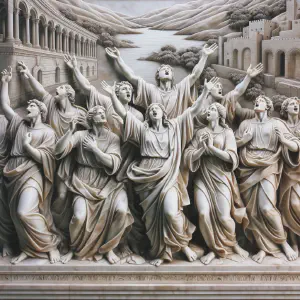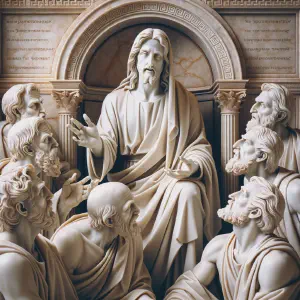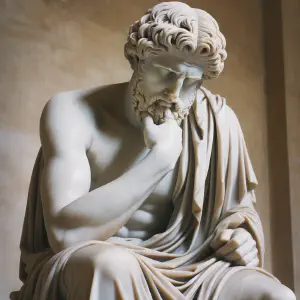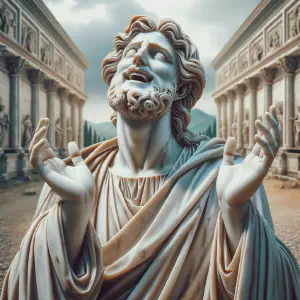The Fall of a King and the Wisdom of the Messiah



In contrast, in Jerusalem, Jesus engaged in a profound discourse with the Sadducees. They challenged Him with a question about the resurrection, using the tale of a woman who had married seven brothers. Jesus, with divine insight, elucidated the nature of life after death, where earthly ties lose their significance, and existence transcends mortal understanding. He affirmed that God is not the God of the dead, but of the living, revealing a truth that left His questioners in awe. This marked a moment of revelation, where the wisdom of the Messiah illuminated the path to eternal life.
Five Questions
What does the story of King Antiochus tell us about the dangers of greed and power?
The story of King Antiochus vividly illustrates the destructive nature of greed and the pursuit of power. Antiochus’ ambition led him to attempt the conquest of Elymais, driven by the city’s wealth. His subsequent defeat and the loss of his armies in Judah exemplify how greed can blind leaders, leading to their downfall. It’s a cautionary tale about how the pursuit of material wealth and power, without regard for justice or morality, ultimately leads to ruin and despair.
How do the Psalms reflect the emotions and faith of the people of Judah during this time?
The Psalms, particularly Psalm 9, echo the triumph and gratitude of the people of Judah. They express deep thanksgiving and joy for God’s salvation and justice. The psalmist speaks of God overturning enemies, uplifting the oppressed, and erasing the wicked from memory. This reflects the people’s faith in God’s righteousness and their relief at being delivered from their oppressors, affirming their belief in a just and protective God.
In the Gospel of Luke, how does Jesus’ response to the Sadducees’ question about resurrection redefine their understanding of life after death?
Jesus’ response to the Sadducees is profound. He challenges their earthly-bound understanding of relationships and life. By stating that in the resurrection people neither marry nor are given in marriage and are like angels, He points to a transformed existence beyond death. This redefines the concept of life after death as a state where earthly ties and norms no longer apply, emphasizing a spiritual existence aligned with God.
What lessons about humility and repentance can be drawn from King Antiochus’ realization of his misdeeds on his deathbed?
King Antiochus’ realization of his misdeeds on his deathbed serves as a powerful lesson in humility and repentance. It shows that recognition of one’s wrongdoings, no matter how late, is crucial. His remorse and acknowledgment of the suffering he caused highlight the importance of introspection and repentance. This story teaches us that true power lies in humility and the ability to admit and learn from our mistakes.
How does the overall narrative of these scriptures guide us in our modern-day lives?
These scriptures offer timeless guidance. They teach us the folly of greed and the pursuit of power for its own sake, as seen in the story of King Antiochus. The Psalms remind us to maintain faith and thankfulness, especially in times of trial. Jesus’ teachings in the Gospel of Luke enlighten us about eternal life, encouraging us to look beyond our mortal existence. Collectively, these lessons urge us to live lives grounded in humility, faith, and an understanding of justice that transcends earthly concerns.
Bible Study
1 Maccabees 6:1-13
As King Antiochus was traversing the inland provinces,
he heard that in Persia there was a city called Elymais,
famous for its wealth in silver and gold,
and that its temple was very rich,
containing gold helmets, breastplates, and weapons
left there by Alexander, son of Philip,
king of Macedon, the first king of the Greeks.
He went therefore and tried to capture and pillage the city.
But he could not do so,
because his plan became known to the people of the city
who rose up in battle against him.
So he retreated and in great dismay withdrew from there
to return to Babylon.
While he was in Persia, a messenger brought him news
that the armies sent into the land of Judah had been put to flight;
that Lysias had gone at first with a strong army
and been driven back by the children of Israel;
that they had grown strong
by reason of the arms, men, and abundant possessions
taken from the armies they had destroyed;
that they had pulled down the Abomination
which he had built upon the altar in Jerusalem;
and that they had surrounded with high walls
both the sanctuary, as it had been before,
and his city of Beth-zur.
When the king heard this news,
he was struck with fear and very much shaken.
Sick with grief because his designs had failed, he took to his bed.
There he remained many days, overwhelmed with sorrow,
for he knew he was going to die.
So he called in all his Friends and said to them:
“Sleep has departed from my eyes,
for my heart is sinking with anxiety.
I said to myself: ‘Into what tribulation have I come,
and in what floods of sorrow am I now!
Yet I was kindly and beloved in my rule.’
But I now recall the evils I did in Jerusalem,
when I carried away all the vessels of gold and silver
that were in it, and for no cause
gave orders that the inhabitants of Judah be destroyed.
I know that this is why these evils have overtaken me;
and now I am dying, in bitter grief, in a foreign land.”
This passage describes King Antiochus’s failed attempt to plunder the city of Elymais and his subsequent defeat in Judah. Antiochus, known for his tyranny and attempts to Hellenize Jewish culture, represents a breach of God’s commandments, especially those against greed and theft. His eventual remorse aligns with Catholic teachings on penance and contrition. The narrative serves as a moral lesson on the dangers of greed and the importance of humility, aligning with the Catholic emphasis on repentance and moral integrity.
Psalm 9:2-3, 4 and 6, 16 and 19
R. (see 16a) I will rejoice in your salvation, O Lord.
I will give thanks to you, O LORD, with all my heart;
I will declare all your wondrous deeds.
I will be glad and exult in you;
I will sing praise to your name, Most High.
R. I will rejoice in your salvation, O Lord.
Because my enemies are turned back,
overthrown and destroyed before you.
You rebuked the nations and destroyed the wicked;
their name you blotted out forever and ever.
R. I will rejoice in your salvation, O Lord.
The nations are sunk in the pit they have made;
in the snare they set, their foot is caught.
For the needy shall not always be forgotten,
nor shall the hope of the afflicted forever perish.
R. I will rejoice in your salvation, O Lord.
Psalm 9 expresses gratitude and praise to God for delivering justice against enemies. This Psalm reflects the role of God as a divine judge and protector, consistent with Catholic teachings on God’s righteousness and mercy. The celebration of the downfall of the wicked and the protection of the oppressed aligns with Catholic values of social justice and the preferential option for the poor. It underscores the acts of mercy and the belief in God’s ultimate judgment and vindication of the righteous.
Luke 20:27-40
Some Sadducees, those who deny that there is a resurrection,
came forward and put this question to Jesus, saying,
“Teacher, Moses wrote for us,
If someone’s brother dies leaving a wife but no child,
his brother must take the wife
and raise up descendants for his brother.
Now there were seven brothers;
the first married a woman but died childless.
Then the second and the third married her,
and likewise all the seven died childless.
Finally the woman also died.
Now at the resurrection whose wife will that woman be?
For all seven had been married to her.”
Jesus said to them,
“The children of this age marry and remarry;
but those who are deemed worthy to attain to the coming age
and to the resurrection of the dead
neither marry nor are given in marriage.
They can no longer die,
for they are like angels;
and they are the children of God
because they are the ones who will rise.
That the dead will rise
even Moses made known in the passage about the bush,
when he called ‘Lord’
the God of Abraham, the God of Isaac, and the God of Jacob;
and he is not God of the dead, but of the living,
for to him all are alive.”
Some of the scribes said in reply,
“Teacher, you have answered well.”
And they no longer dared to ask him anything.
In this passage, Jesus engages with the Sadducees, who challenge Him on the concept of resurrection. Jesus, emphasizing the eternal nature of life after death, redefines earthly relationships in the context of the kingdom of God. This teaching aligns with Catholic beliefs in the resurrection of the body and the eternal life of the soul. Jesus’ response highlights the Catholic doctrine of the Communion of Saints and the transformed existence in the afterlife. His message reinforces the importance of living a life in accordance with God’s will, transcending earthly concerns and focusing on eternal salvation.
Lessons
These passages remind us of the transient nature of earthly power and the lasting truth of God’s justice. King Antiochus, in his pursuit of wealth and conquest, ultimately faces defeat and mortality, weighed down by the guilt of his actions. The Psalms celebrate the triumph of the righteous and God’s eternal justice. The Gospel of Luke, through Jesus’ teaching, enlightens us about the nature of resurrection and eternal life, transcending earthly bonds. In humility, we are called to recognize the impermanence of worldly pursuits and to seek a deeper understanding of divine truth and justice.
Meditation Prayer


